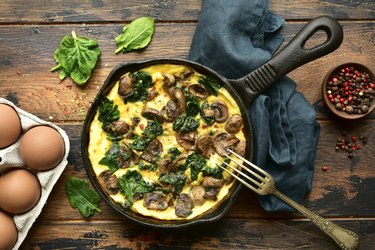
We're all extra concerned about "boosting" our immune systems these days. And while an overall nutritious diet (along with other healthy lifestyle habits, like getting enough sleep) plays a big role in that, you'll also want to pay attention to certain nutrients.
In particular, zinc and vitamin D have spent time in the spotlight as of late: Because of its anti-viral and immune-regulating properties, zinc has the potential to be a supportive treatment in people with COVID-19, per an August 2020 review in the journal Maturitas. Meanwhile, deficiency in vitamin D has been suggested to increase the incidence and severity of COVID-19 infection, according to the review.
Video of the Day
Video of the Day
That said, simply eating foods with vitamin D and zinc won't keep you from getting sick, but it could help support an overall healthy immune system.
"Zinc and vitamin D are nutrients that are getting lots of attention for immunity, and with good reason — they support a healthy immune system," says Dawn Jackson Blatner, RDN, CSSD.
Most of the immune-supporting credit that vitamin D and zinc are getting is due to the fact that they are most helpful for people deficient in them, she adds.
You can find both vitamin D and zinc in foods, but vitamin D occurs naturally in far fewer foods. Still, some foods like fatty fish and mushrooms exposed to sunlight contain vitamin D, and you can also find foods fortified with vitamin D.
"Vitamin D is hard to get via food, so finding it with zinc is unicorn status," Blatner says. "Vitamin D is a shortfall nutrient, meaning we don't get enough of it. Both vitamin D and zinc affect immune cells, and they also both act as an anti-inflammatory."
Try including more of these zinc and vitamin D foods in your diet, and speak to your doctor if you're considering adding a supplement to your routine.
1. Milk
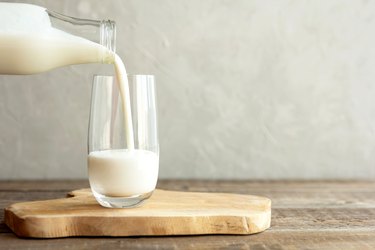
Per 1 cup serving:
- Zinc: 8% DV
- Vitamin D: 16% DV
A glass of milk can support your immune system with both zinc and vitamin D — even if you're partial to almond or soy milk.
"Many plant milk alternatives are also fortified with vitamin D and zinc," Blatner says. "No matter what type of milk you're looking at, whether it's plant-based or regular milk, double-check the label for its vitamin D and zinc status."
Milk comes with plenty of other benefits: It also provides calcium, potassium and protein. Calcium is necessary for maintaining your bone mass, and dairy products are the main source of calcium in American diets, per the USDA. Meanwhile, potassium-rich diets help to keep your blood pressure healthy.
2. Sockeye Salmon
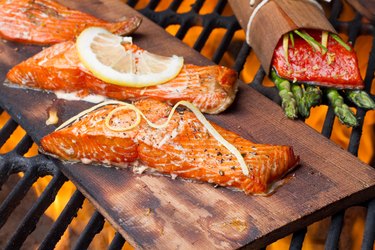
Per 3-oz serving:
- Zinc: 4% DV
- Vitamin D: 71% DV
Fatty fish like sockeye salmon are an overall good choice for your immune system because they provide zinc and vitamin D — plus plenty of protein.
"We tend to associate protein with strong muscles, but protein actually strengthens all of our cells," Blatner says. "That's why it's very important for your overall health and also for your immune system specifically."
Meanwhile, the anti-inflammatory omega-3 fatty acids in salmon are beneficial for your heart health and may even lessen pain in those with rheumatoid arthritis, per the National Institutes of Health (NIH).
3. Canned Salmon
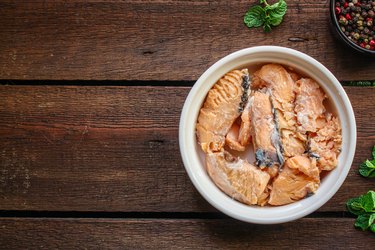
Per 3-oz serving:
- Zinc: 6% DV
- Vitamin D: 89% DV
Canned salmon can provide even more vitamin D and zinc than fresh salmon, and has the added benefit of offering up 15 percent of your daily value of calcium. This is a particularly good option if you usually don't cook salmon because of the prep time it takes.
"Fatty fish is a natural source of vitamin D, and to get the benefits, it does not have to be fresh," Blatner says. "Buy canned salmon, tuna or sardines so that you always have fatty fish on hand in the pantry. It's already cooked, so that makes it a major time-saver!"
4. Cremini Mushrooms (Exposed to Sunlight)
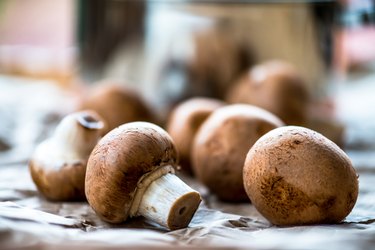
Per 1-cup serving:
- Zinc: 9% DV
- Vitamin D: 139% DV
To get the beneficial vitamin D, be sure to look for cremini mushrooms with "exposed to sunlight" on the label.
"Mushrooms make vitamin D just like humans, so they have a good dose of it when they're exposed to the sun," Blatner says. "But if they're not grown in the sun, they're not a good source of vitamin D." You'll also get 98 percent of your daily value of vitamin D and 5 percent DV zinc in maitake mushrooms exposed to sunlight.
All mushroom varieties are low in calories and fat and contain fiber, per the Harvard T.H. Chan School of Public Health. They also pack plant substances such as polysaccharides, polyphenols, indoles and carotenoids, which cell and animal studies have shown have antioxidant, anti-inflammatory, and even anti-cancer effects, according to the university.
5. Low-Fat Yogurt
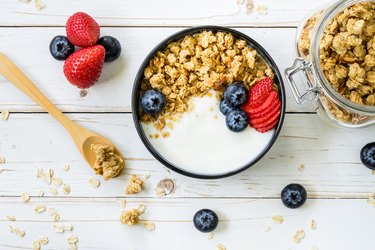
Per 1-cup serving:
- Zinc: 16% DV
- Vitamin D: 16% DV
Some yogurt is fortified with vitamin D, which makes this snack an even healthier option. Yogurt is also rich in protein, calcium, phosphorus and B vitamins, and its live bacterial content may help support microbiota diversity in the gut, per the Harvard T.H. Chan School of Public Health.
The bacteria in your gut is closely linked to your body's immune system, and the composition of your gut may be related to various diseases, per Johns Hopkins Medicine.
"Yogurt contains probiotics, or beneficial bacteria, that not only keep our digestive tract strong but also activate immune cells so they are ready for outside germ invaders," Blatner says.
6. Fortified Whole-Grain Cereal
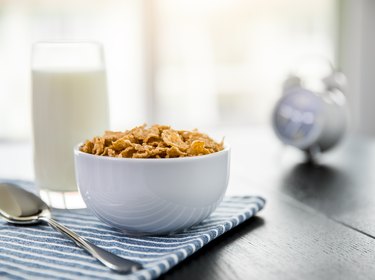
Per ¾-cup serving:
- Zinc: 136% DV
- Vitamin D: 12% DV
In an ideal world, it'd be best to get most of your vitamins and minerals from whole foods because they don't have unwanted ingredients like added sugar. That said, fortified foods like cereal can be helpful when you're looking for an easy source of zinc and vitamin D — especially if you opt for a low-sugar variety.
"Going for low-sugar cereal is better than starting your day with a danish or doughnuts," Blatner says. "If somebody is looking for a really quick fix, fortified foods like cereal would have that vitamin D and zinc. They basically grind up multiple vitamins and sprinkle them into the cereal."
7. Pork Chops
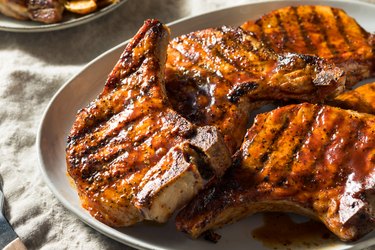
Per 3-oz serving:
- Zinc: 24% DV
- Vitamin D: 4% DV
Red meat like pork chops shouldn't be part of your everyday diet as red meat is considered a probable carcinogen, or something that probably causes cancer, according to a meta-analysis published in the September 2021 European Journal of Epidemiology.
Tip
The American Institute for Cancer Research recommends eating no more than three portions of red meat per week, or about 12 to 18 ounces, cooked. More than 18 ounces of red meat per week is tied to increased cancer risk.
That said, when you do choose to have a pork chop, it'll provide vitamin D and zinc along with other health benefits.
For instance, a three-ounce serving of pork chops contains 22.6 grams of protein, or 45 percent of your daily value. It also contains several B vitamins and selenium, which plays a critical role in thyroid hormone metabolism, DNA synthesis and protection from oxidative damage and infection, per the NIH.
8. Eggs
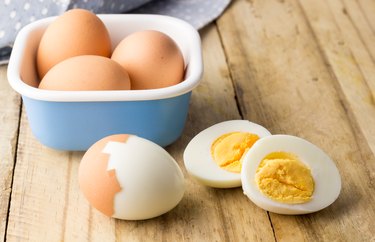
Per one egg:
- Zinc: 5% DV
- Vitamin D: 6% DV
The yolks contain all of the egg's vitamin D and zinc contents. Although eggs were once considered unhealthy due to their high cholesterol content (one large egg yolk has 200 milligrams of cholesterol), experts now know that dietary cholesterol and blood cholesterol levels are only weakly related, per the Harvard T.H Chan School of Public Health.
Today, studies show saturated and trans fats have more of an influence on blood cholesterol. While you may want to be cautious about eating egg yolks if you have high total and LDL cholesterol (or if you have diabetes, which puts you at higher risk of heart disease), research has shown an egg per day is generally safe, per the American Heart Association.
- My Food Data: "Whole Milk"
- U.S. Department of Agriculture: "Nutrients and health benefits"
- My Food Data: "Cooked Sockeye Salmon"
- National Institutes of Health: "7 Things To Know About Omega-3 Fatty Acids"
- My Food Data: "Canned Salmon"
- My Food Data: "Raw Cremini Mushrooms (Exposed To Sunlight Or UV)"
- My Food Data: "Maitake Mushrooms"
- Harvard T.H. Chan School of Public Health: "Mushrooms"
- My Food Data: "Low Fat Fruit Yogurt (With Vitamin D)"
- Harvard T.H. Chan School of Public Health: "Yogurt"
- My Food Data: "General Mills Whole Grain Total"
- My Food Data: "Pork Chops (With Fat)"
- National Institutes of Health: "Selenium"
- My Food Data: "Hard Boiled Eggs"
- Harvard T.H Chan School of Public Health: "Eggs"
- Maturitas: "Immune-boosting role of vitamins D, C, E, zinc, selenium and omega-3 fatty acids: Could they help against COVID-19?"
- American Institute for Cancer Research: "Limit Consumption of Red and Processed Meat"
- American Heart Association: "Are eggs good for you or not?"
- Johns Hopkins Medicine: "New Evidence: Immune System Cells in the Gut Linked to Stress-Induced Depression"
- European Journal of Epidemiology: "Consumption of Red Meat and Processed Meat and Cancer Incidence: a Systematic Review and Meta-Analysis of Prospective Studies"